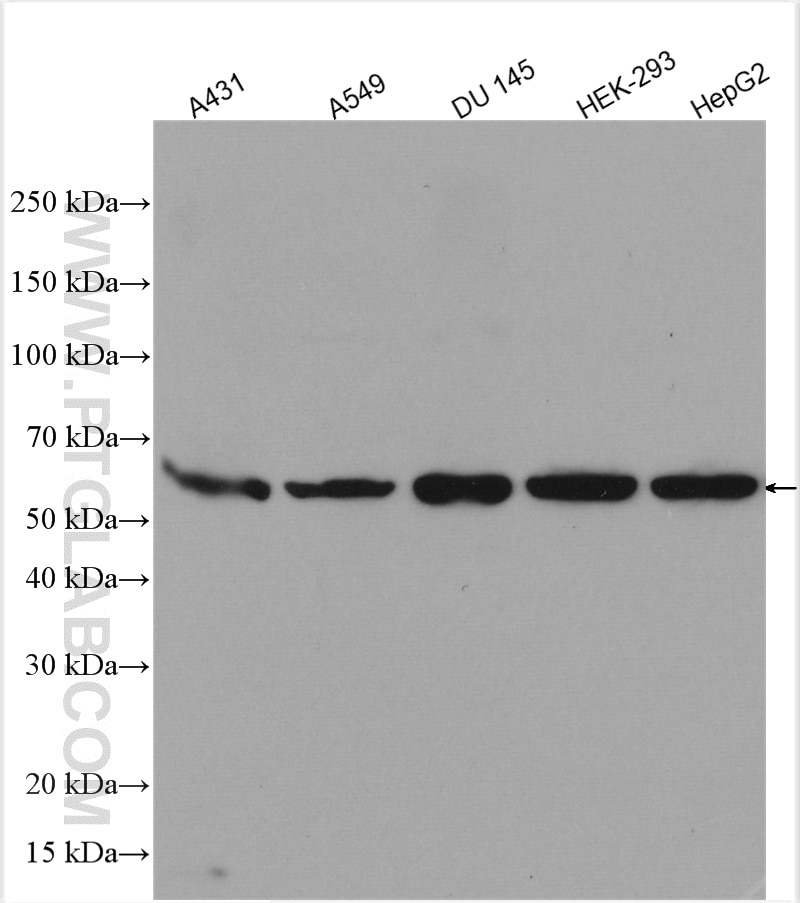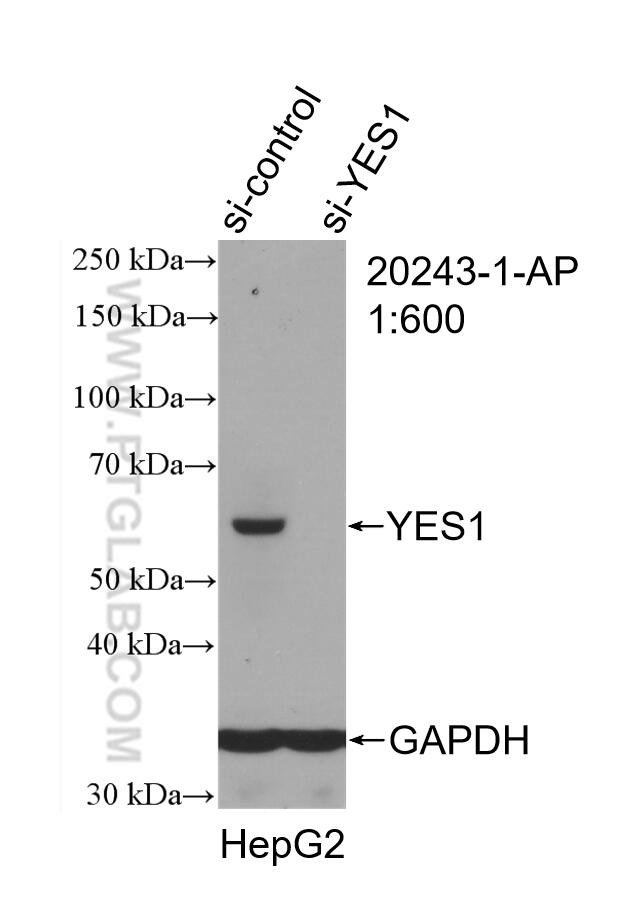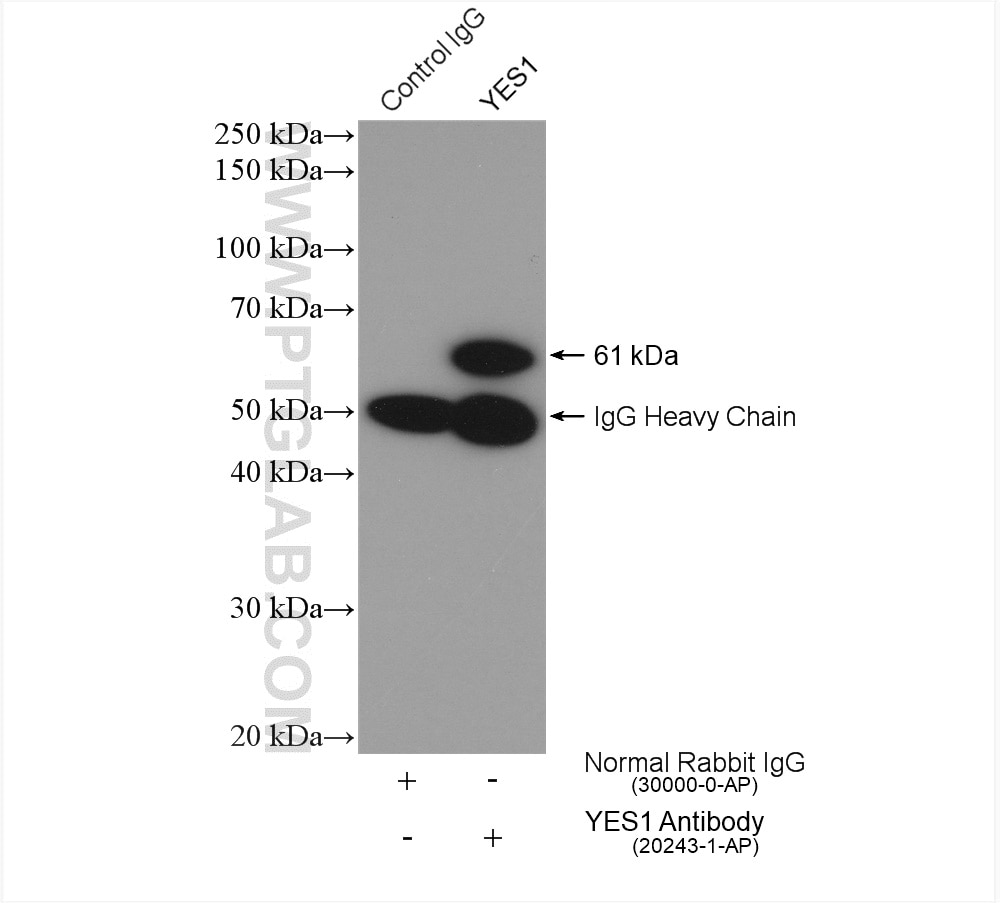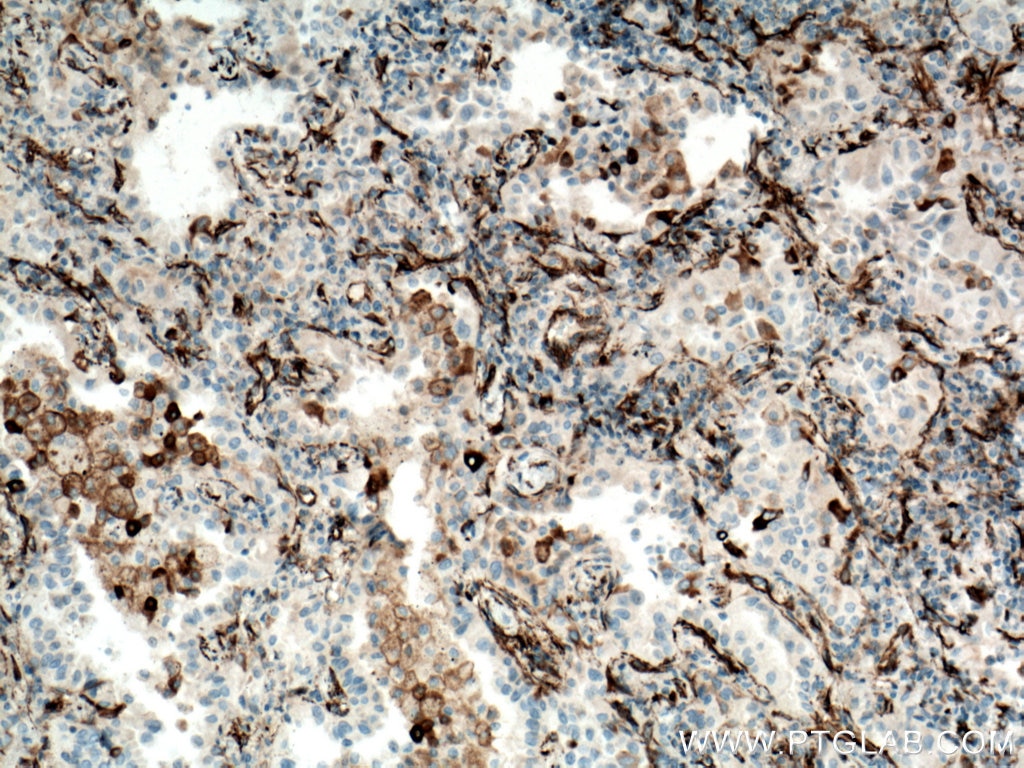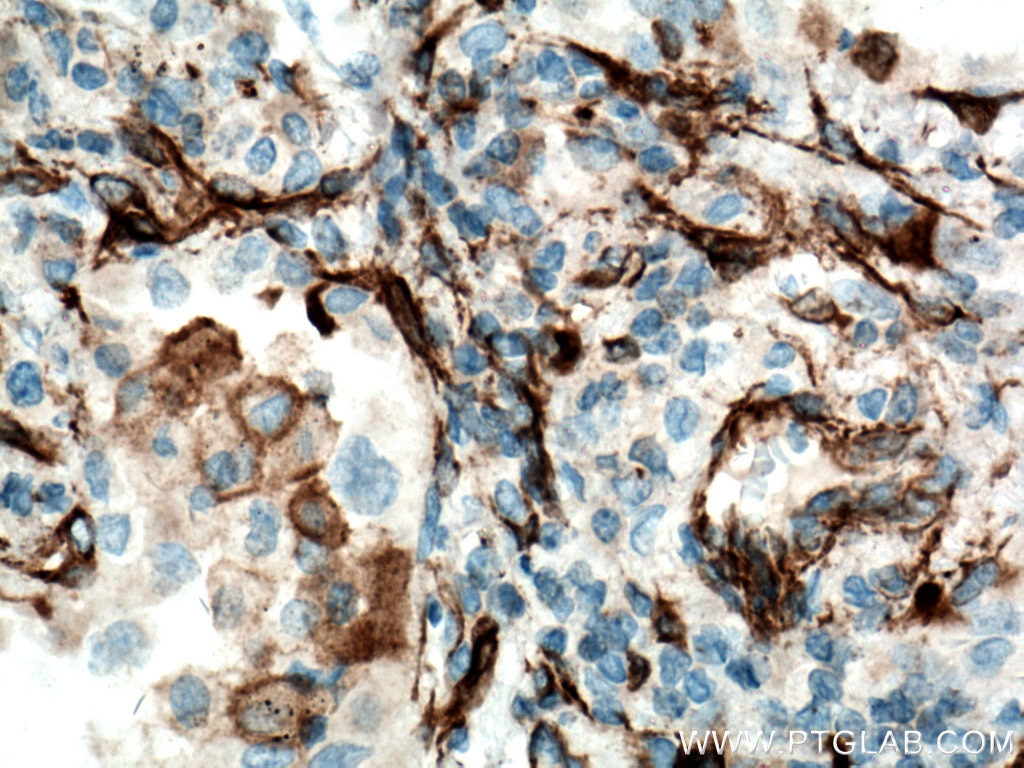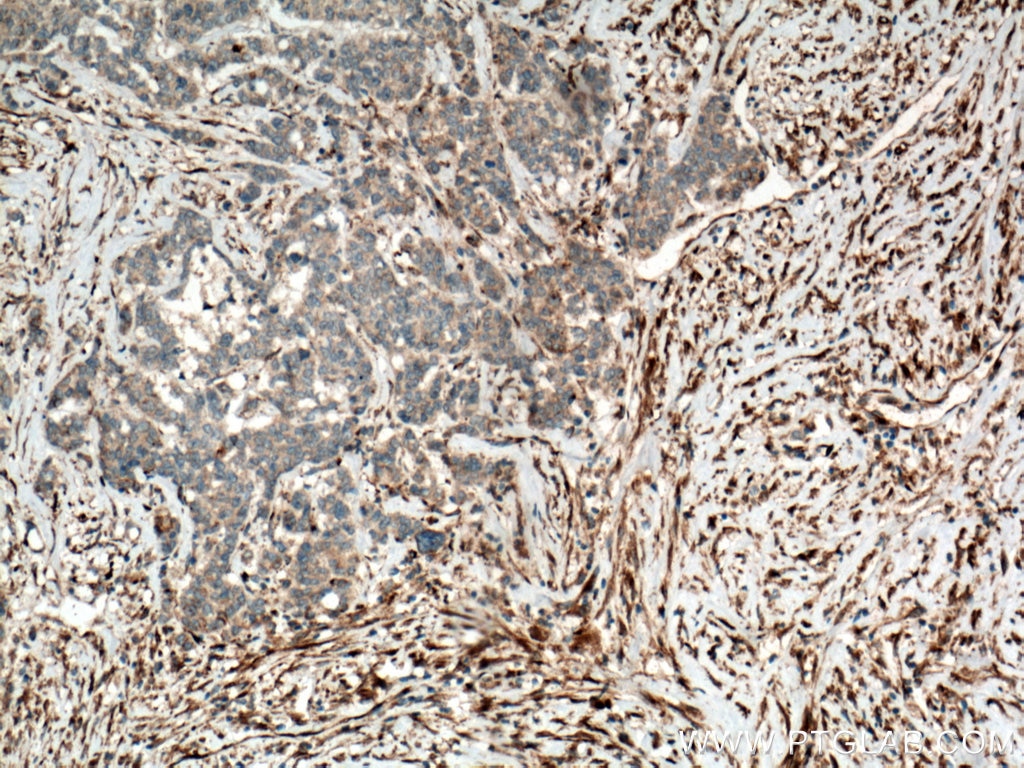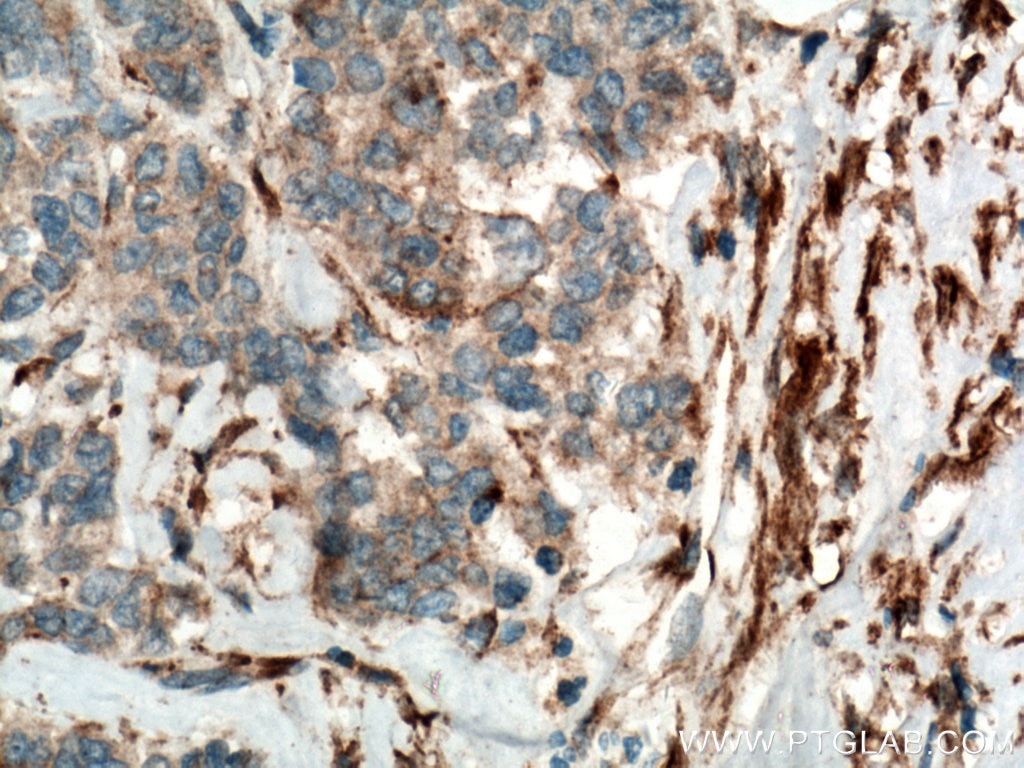- Phare
- Validé par KD/KO
Anticorps Polyclonal de lapin anti-YES1-Specific
YES1-Specific Polyclonal Antibody for WB, IHC, IP, ELISA
Hôte / Isotype
Lapin / IgG
Réactivité testée
Humain, rat, souris
Applications
WB, IHC, IP, ELISA
Conjugaison
Non conjugué
N° de cat : 20243-1-AP
Synonymes
Galerie de données de validation
Applications testées
| Résultats positifs en WB | cellules A431, cellules A549, cellules DU 145, cellules HEK-293, cellules HepG2 |
| Résultats positifs en IP | cellules A549, |
| Résultats positifs en IHC | tissu de cancer du poumon humain, tissu de cancer du côlon humain il est suggéré de démasquer l'antigène avec un tampon de TE buffer pH 9.0; (*) À défaut, 'le démasquage de l'antigène peut être 'effectué avec un tampon citrate pH 6,0. |
Dilution recommandée
| Application | Dilution |
|---|---|
| Western Blot (WB) | WB : 1:500-1:1000 |
| Immunoprécipitation (IP) | IP : 0.5-4.0 ug for 1.0-3.0 mg of total protein lysate |
| Immunohistochimie (IHC) | IHC : 1:50-1:500 |
| It is recommended that this reagent should be titrated in each testing system to obtain optimal results. | |
| Sample-dependent, check data in validation data gallery | |
Applications publiées
| KD/KO | See 2 publications below |
| WB | See 6 publications below |
| IHC | See 2 publications below |
Informations sur le produit
20243-1-AP cible YES1-Specific dans les applications de WB, IHC, IP, ELISA et montre une réactivité avec des échantillons Humain, rat, souris
| Réactivité | Humain, rat, souris |
| Réactivité citée | Humain, souris |
| Hôte / Isotype | Lapin / IgG |
| Clonalité | Polyclonal |
| Type | Anticorps |
| Immunogène | Peptide |
| Nom complet | v-yes-1 Yamaguchi sarcoma viral oncogene homolog 1 |
| Masse moléculaire calculée | 61 kDa |
| Poids moléculaire observé | 61 kDa |
| Numéro d’acquisition GenBank | NM_005433 |
| Symbole du gène | YES1 |
| Identification du gène (NCBI) | 7525 |
| Conjugaison | Non conjugué |
| Forme | Liquide |
| Méthode de purification | Purification par affinité contre l'antigène |
| Tampon de stockage | PBS with 0.02% sodium azide and 50% glycerol |
| Conditions de stockage | Stocker à -20°C. Stable pendant un an après l'expédition. L'aliquotage n'est pas nécessaire pour le stockage à -20oC Les 20ul contiennent 0,1% de BSA. |
Informations générales
YES1, also named as p61-Yes and YES, belongs to the protein kinase superfamily, Tyr protein kinase family and SRC subfamily. It promotes infectivity of Neisseria gonorrhoeae in epithelial cells by phosphorylating MCP/CD46. YES1 catalyzes the reaction: ATP + a [protein]-L-tyrosine = ADP + a [protein]-L-tyrosine phosphate. The antibody is specific to YES1.
Protocole
| Product Specific Protocols | |
|---|---|
| WB protocol for YES1-Specific antibody 20243-1-AP | Download protocol |
| IHC protocol for YES1-Specific antibody 20243-1-AP | Download protocol |
| IP protocol for YES1-Specific antibody 20243-1-AP | Download protocol |
| Standard Protocols | |
|---|---|
| Click here to view our Standard Protocols |
Publications
| Species | Application | Title |
|---|---|---|
Am J Respir Crit Care Med YES1 Drives Lung Cancer Growth and Progression and Predicts Sensitivity to Dasatinib. | ||
Sci Adv A brain proteomic signature of incipient Alzheimer's disease in young APOE ε4 carriers identifies novel drug targets. | ||
J Immunother Cancer SRC family kinase (SFK) inhibitor dasatinib improves the antitumor activity of anti-PD-1 in NSCLC models by inhibiting Treg cell conversion and proliferation.
| ||
Cell Death Dis Linc01133 contributes to gastric cancer growth by enhancing YES1-dependent YAP1 nuclear translocation via sponging miR-145-5p. | ||
J Cell Biochem miR-17-5p up-regulates YES1 to modulate the cell cycle progression and apoptosis in ovarian cancer cell lines.
| ||
iScience DAB2IP suppresses invadopodia formation through destabilizing ALK by interacting with USP10 in breast cancer |
